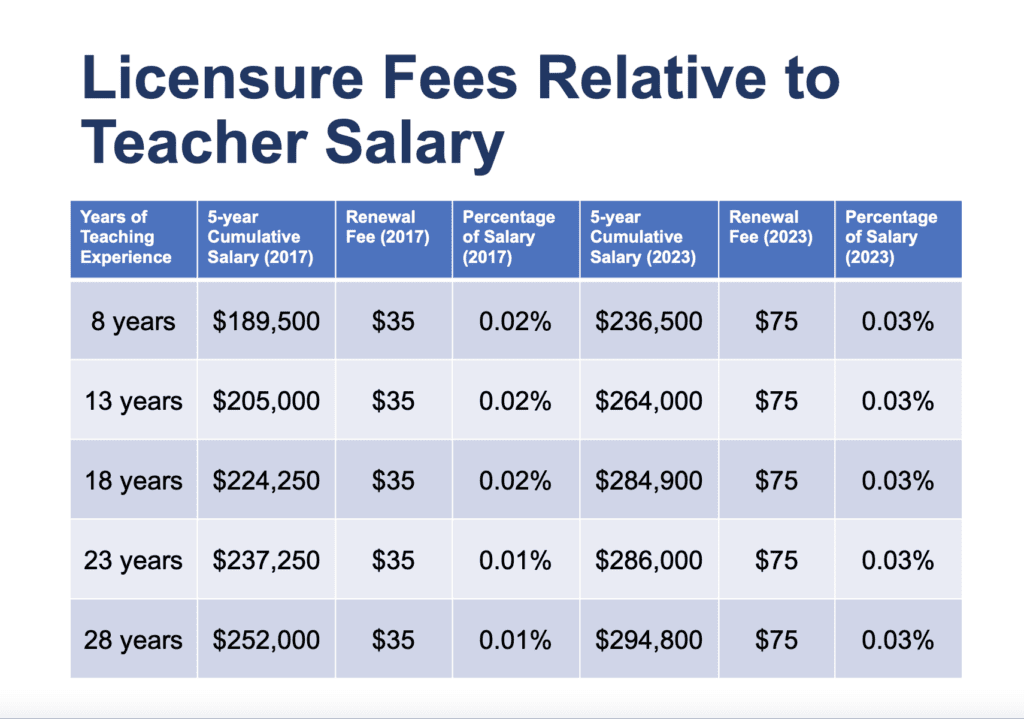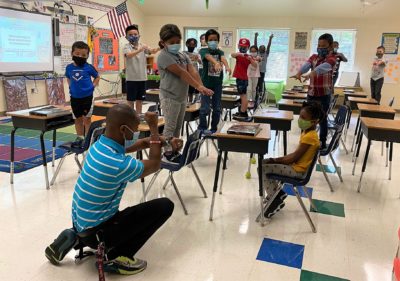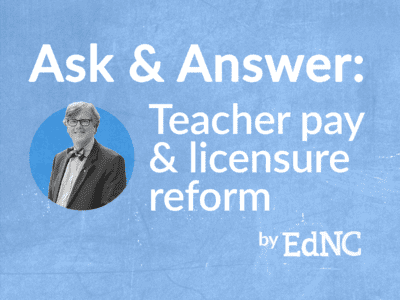

Share this story
- “I understand the rationale and the business side of the increase,” one member said of the request. “I think that large of an increase – which I know is only over every five years – can be a lot to put back on teachers."
- At the July PEPSC meeting, the commission discussion teacher licensure fees, policy amendments to the state’s licensure renewal requirements, and accountability rules for Educator Preparation Programs.
|
|
The Professional Educator Preparation and Standards Commission (PEPSC) voted 9-3 last Thursday against increasing the cost of initial teacher licensure fees, with many members expressing concern about passing additional costs onto teachers.
The requested increase was intended to boost the capacity of the licensure office, said Thomas Tomberlin, the Department of Public Instruction’s (DPI) senior director of educator preparation, licensure, and performance.
“The context of this is based on historical data. The licensure office processes approximately 50,000 applicants per year,” Tomberlin said. “Many of you know, especially in the Local Education Agencies (LEAs), that educators and even some LEA representatives expressed frustration with the phone lines – that they’re tied up for days.”
The offices also answered upwards of 25,000 emails and calls each last year, he said. There are currently 19 employees in the licensure office.
The increased fees – yielding an expected $1.2 million – would go toward additional staff and technology, Tomberlin said. The department has repeatedly requested an increase in state funding, he said, in order to increase support without increasing fees.
The requested proposal would have increased the cost of an in-state initial professional license (IPL) from $70 to $85, to be reimbursed if the applicant successfully earns their license.
The proposal also would have increased out-of-state IPLs and an initial residency license from $100 to $115. Currently, the fee for renewing applications is $35 every five years. Under the proposal, that number would increase to $75. Finally, all other applications would increase from $60 to $70.


If the proposal had passed, it would have gone before the State Board of Education in August.
Chair Van Dempsey, who voted against the request, said he believes the commission can reach a compromise in the future between improving services at the licensure office and not passing along additional costs to teachers.
Madison Edwards, a social studies teacher at North Carolina Cyber Academy, noted the “little-to-no raise in salary” for teachers in this year’s proposed state budget.
“I understand the rationale and the business side of the increase,” she said. “I just wouldn’t feel right if I didn’t say I think that large of an increase – which I know is only over every five years – can be a lot to put back on teachers in addition to all the things they’re paying for in their own classrooms.”
You can view the full presentation here.
More on licensure
PEPSC also approved several policy amendments to the state’s licensure renewal requirements. These will be heard by the State Board of Education in August.
Current renewal requirements allow educators with an expired CPL on a five-year renewal cycle to be eligible for a three-year validated license at the request of their public school unit.
The updates approved last week specify that at the end of the three-year validated cycle, the license will be issued with a new five-year renewal cycle if the educator completes at least eight renewal credits.
That option does not apply to currently employed educators who have not met renewal requirements, or educators who were employed in the fiscal year prior to the application.
The updated requirements also outline guidelines for the Lifetime License, which replaces the retirement license. A CPL will remain in effect for five years after retirement, the document says.
The proposed updates also outline updated credit requirements for licensed educators.
You can read the full document of renewal requirements here.
In March, the State Board of Education voted to ask lawmakers for authorization to run a six-year pilot of its Pathways to Excellence plan to overhaul licensure and teacher pay in North Carolina.
The 2023-24 school year would have been a planning year, followed by five years to pilot, EdNC previously reported.
There will no longer be a pilot of the plan this year, Dempsey told WFAE earlier this month.
Dempsey told WFAE reporter Ann Doss Helms that legislative leaders are clearly focused on the expansion of private school vouchers over teacher licensure reform.
“If we had known then what we know now, we may have understood either No. 1, we might have needed to navigate it differently, or that given the amount of oxygen that some of the other legislation was going to take up, there wasn’t going to be a lot of room for the Pathways proposal,” Dempsey told WFAE. “And if you look at the cost of just the voucher plan alone ($1.7 billion over the next five years), that takes a lot of money that could have gone into piloting and implementation of the Pathways model.”
Rules for EPPs and PEPSC leadership processes
Last week, the commission also heard a brief update about accountability rules for Educator Preparation Programs (EPP), first discussed in June. DPI staff said they expect to bring requested data back to the commission next month, with action expected to take place then.
There are 56 EPPs across the state, including 15 programs in the UNC System, 32 private programs, and nine alternative programs that lead to licensure, but not a degree.
Among the latter group, the State Board of Education has also recently approved for several community colleges to offer the Elementary Education Residency Licensure Certificate Program, effective fall 2023.
The proposed EPP rules include requiring the State Board of Education to establish standards of performance for EPPs, and for the N.C. Department of Public Instruction (NCDPI) to collect data for accountability, among other things.
“The establishment of performance standards is critical to assure that authorized EPPs are providing a minimum standard of quality in the preparation of teacher candidates and ultimately positively impact the quality of the instruction those teachers provide children in North Carolina public and charter schools. The proposed rules were developed with careful consideration of maintaining high expectations in the teacher work force, the impact on the teacher pipeline, and the limited resources available at the NCDPI.”
EPP document approved by PEPSC
You can read the full document regarding EPP accountability here.
The commission also reelected Dr. Ann Bullock, dean of Elon University’s School of Education, as secretary of PEPSC.
Last month, PEPSC adopted internal rules for how and when to nominate and elect people to the commission, including election procedures for the offices of chair, vice chair, and secretary. You can read those guidelines here.
Chair Dempsey, the former dean of UNC Wilmington’s College of Education, and vice-chair Dr. Aaron Fleming, Harnett County Schools Superintendent, will also continue in their roles. Both Dempsey and Fleming started their roles last August following the end of Dr. Patrick Miller’s term as chair. Miller had served in the role since PEPSC’s inception in 2017.
PEPSC meets next on Aug. 10 at 9 a.m. Starting in September, PEPSC will begin meeting at 3:30 p.m. on the second Thursday of the month in order for more teachers to attend.





